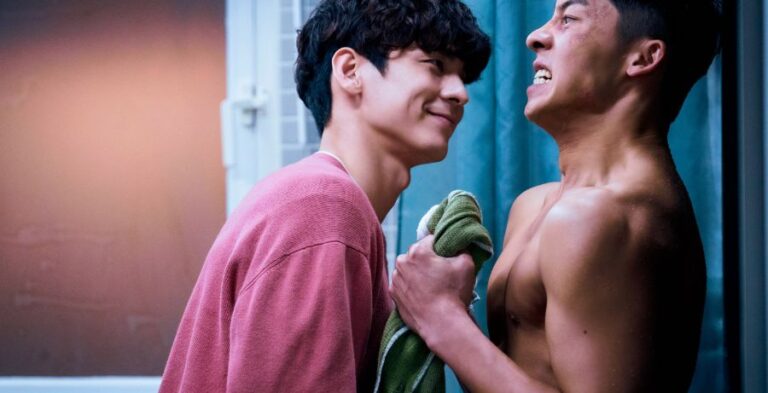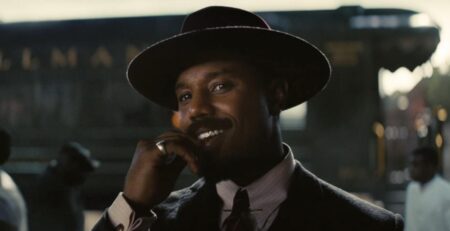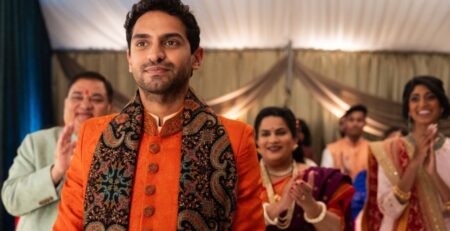The Boy Love genre is a tried and true one. Focusing on male/male relationships, this genre has been the battle arena for nurturing strong female characters and exploring queer themes. Cheng Wei-hao’s Marry My Dead Body is the latest addition to the genre. It takes the patriarchal tradition of ghost marriage and subverts it with its queer angle. In the process, we witness a story that tackles toxic masculinity head-on and reminds us that the ideal partner is where you least expect it.
In Marry My Dead Body, we are introduced to the homophobic, misogynist detective Wu Ming-Han (Greg Hsu). While he is reprimanded by his boss and his partner, Lin Tzu-ching (Gingle Wang) for his behavior, he still hasn’t faced any repercussions. That all starts to change when he foolishly engages in a high-speed chase with a criminal.
After getting his car stuck in the chase, he’s forced to pick up the leftover evidence while Tzu-ching chases down the criminal on foot. He mistakes a red envelope as part of the evidence and picks it up, which turns out to be a set-up. A grandmother has tricked him into a ghost marriage for her deceased grandson, Mao Mao (Austin Lin). If he doesn’t comply, bad luck will follow. And until he agrees to the marriage, it does.
Much of the success of Marry My Dead Body has to do with Greg Hsu and Austin Lin. Hsu’s Ming-Han is the personification of forced masculinity. Extremely homophobic and misogynistic, he tries his hardest to be a man’s man, but it fails to make him happy. It isn’t until he meets Mao Mao that he is forced to confront his internal bias.

Hsu and Lin bounce off each other fabulously. Lin’s Mao Mao is flamboyant, happy, and comfortable with himself. He’s not afraid to call out Ming-Han’s behavior, going as far as to possess him at points to get Ming-Han to stop calling him slurs. To Hsu’s credit, when possessed, he goes all in and it turns out to be one of the most memorably hilarious scenes of the film.
Mao Mao’s journey is not easily seen at first. He is trying to reincarnate, which means figuring out what it is that keeps him lingering in this world. Starting off with superficial wants, as time goes by in Marry My Dead Body, we realize that all Mao Mao wanted is to be loved and accepted by one person. Unable to communicate this while alive, it is Ming-Han who opens the door for communication and allows Mao Mao to unburden himself.
Through their experiences together, they grow to care for one another. Ming-Han has the largest growth of them all, and we see how this reflects in Hsu’s performance. His stature gradually softens, going from bombastic to calm. There is no shame in restraint. There is also no shame in his relationship with Mao Mao. In one of the most pivotal moments of the film, you can’t help but cry when you see how deep their care for each other has grown, and that is how you know Marry My Dead Body has succeeded.
Mao Mao’s influence on Ming-Han also leads to Mao Mao’s father seeing how damaging his actions were to his son. While he does love and care for his son, he failed to show or communicate this to him in life. He embodies the cold patriarch, unable to show love to his son openly when all he wanted was for his son to be happy in the end. It is Ming-Han who provokes Mao Mao’s father to finally open up and share, something typically discouraged among men. But, without Mao Mao’s influence, Ming-Han might not have done that in the end.
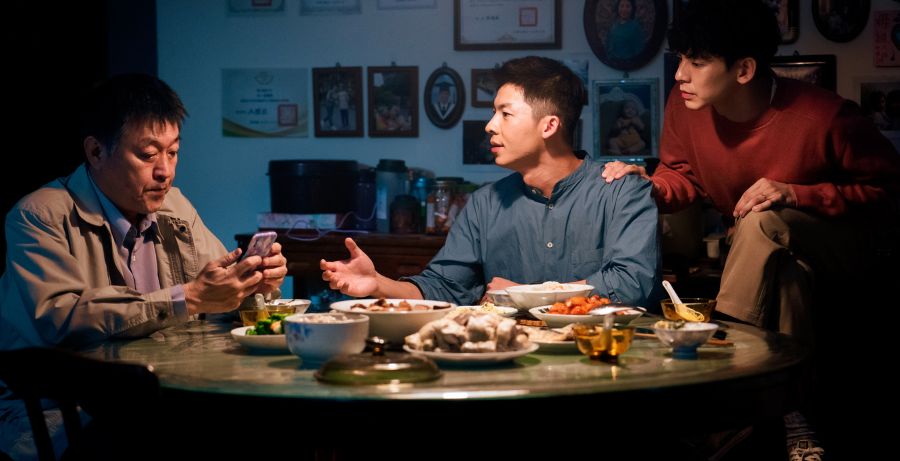
What was also refreshing was seeing how the ghost marriage element was utilized. To simplify, it’s a patriarchal tradition that was mainly used as a means to continue the familial line. Applying the tradition here in a gay marriage subverts the tradition. Filmed before same-sex couples were granted the right to adopt in Taiwan, the use of ghost marriage here carries even further weight. Adopting a child post-ghost marriage was how familial lines were continued. To see this tradition used like this is refreshing and shows how marriage doesn’t have to be confined.
Love itself is shown not to be confined between romantic partners. Ming-Han and Mao Mao aren’t romantic partners. Much like all ghost marriages, their relationship is platonic. A friendship blossoms between the two and ultimately, understanding. They are free to be themselves with one another in a way that patriarchal social constructs discourage. It should not take death for this freedom between male friends to happen. Through Ming-Han and Mao Mao, we see how the constraints we place on men damage them. If we shirk those constraints, we can find our soulmate – regardless of whether it’s platonic or romantic.
Given her rapidly growing success in Taiwan, Gingle Wang continues to make her presence known. In Marry My Dead Body, she plays the beautiful detective Lin Tzu-ching. She deals with misogyny in the workplace but pushes against it at every turn. While her performance is great, Tzu-ching’s overall storyline is distracting and takes away focus from Ming-Han and Mao Mao. If she was cut from the screenplay, little adjustments here and there could be made to keep the general trajectory the same without missing a beat.
Music legend Jolin Tsai is featured musically throughout. An LBGTQIA+ icon in Taiwan, it makes so much sense that her songs would be featured here. Her song “Untitled” (親愛的對象), which translates to Dearest Partner, is a running theme. Speaking of partners, both romantic and platonic, it reminds us that love comes in all shapes and sizes. Love is not confined to romance. It embodies how we are around those we care about. And, by the end of Marry My Dead Body, we see how Ming-Han and Mao Mao are ideal partners for one another.
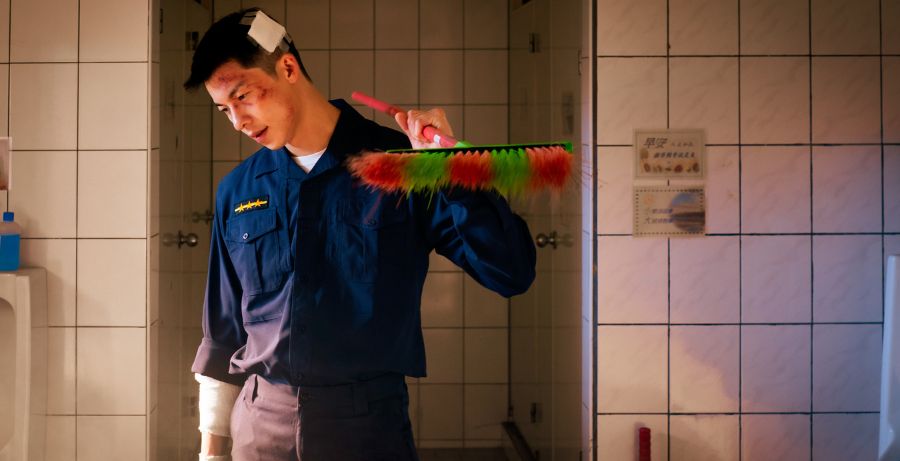
Despite the perfect chemistry between our two leads and its comedic shenanigans, Marry My Dead Body gets let down by its length and poor execution of CGI. Could the film have benefited by cutting a storyline or two? Possibly. The film tackles an awful lot: murder mysteries, drug busts, broken hearts, and more. But because it’s tackling so much, the film length is stretched farther than the comedy can compensate for.
Then there’s the CGI. It’s most noticeable from the get-go in the car chase sequence, with the actual chases appearing to be rendered rather than practical. From speeding down a highway to the crushing of the car, it’s enough to take a viewer out. Even the more supernatural elements suffer. Whether Mao Mao goes rogue or pops in and out of the wall, the execution of the effects falls flat.
Despite its issues, Marry My Dead Body offers a hilariously heartwarming twist to a long-time tradition. Subverting the gendered expectations associated with ghost marriage, the relationship between Ming-Han and Mao Mao highlights what ideal partners should be. It doesn’t always have to be romantic. What matters is how much you care for your partner in the end, in life and in death.
Marry My Dead Body is now on Netflix.
Marry My Dead Body
-
Rating - 7.5/107.5/10
TL;DR
Despite its issues, Marry My Dead Body offers a hilariously heartwarming twist to a long-time tradition. Subverting the gendered expectations associated with the ghost marriage, the relationship between Ming-Han and Mao Mao highlights what ideal partners should be. It doesn’t always have to be romantic. What matters is how much you care for your partner in the end, in life and in death.

